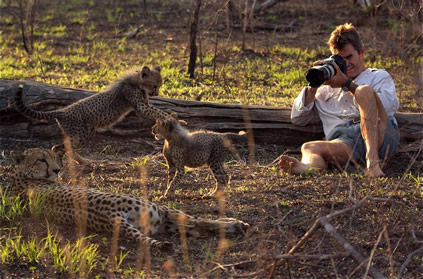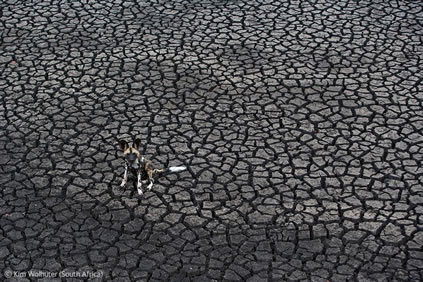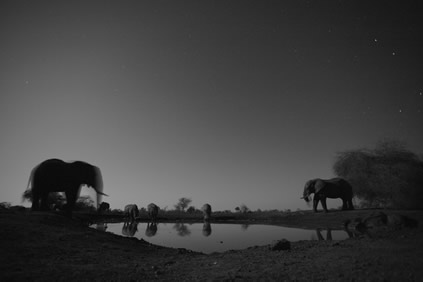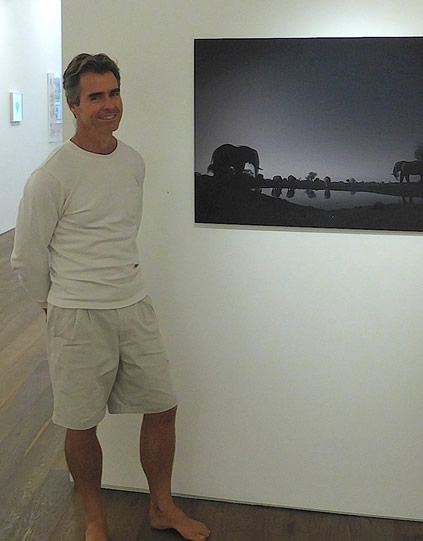 |
|||||||||
|
Kim Wolhuter is an acclaimed – indeed a maverick - South African conservationist, wildlife photographer and filmmaker. His famous grandfather was a founding Ranger of the great Kruger National Park and his father, Harry Wolhuter, became Head Ranger in turn. Kim was born into this life and he chose to emulate and then document it, and for over 30 years he has been making award-winning wildlife films featuring leopards, wild dogs, hyenas, cheetah, lions and currently, honey badgers for world renowned channels such as Animal Planet, National Geographic, The Discovery Chanel and the BBC. In 2017 the BBC broadcast his film Cheetah – Growing up Fast, narrated by Sir David Attenborough.
Cheetahs Growing Up Fast, 2017
Wolhuter works in a unique way. He is mostly barefoot and gets to know his subjects over sustained periods, sometimes for several years, taking things further than most in developing an exceptionally close, trusting relationship with the creatures he is filming.
“I bond with the animals in a way that gives me the kind of access rarely enjoyed by filmmakers. This allows me to portray their lives in the most intimate and natural way, revealing things new to science and exposing unknown vulnerabilities or insights into how they live in the wild day to day.”
“In my ‘Man Cheetah Wild’ movie I followed a pair of cheetah cubs from the age of two months for two years and formed the most incredible bond with them. I used to walk and hunt with them regularly while filming. Afterwards I came across one of them. I hadn't seen her for about a year so I whistled as I approached and sat down a few meters away. She then got up and came over and groomed me, licked me. It must be one of the most amazing experiences I've ever had. I spent about three hours with her hunting that day and then went my way. That's why I do what I do.”
The photographer and film maker, Adrian Steirn made a short film about Wolhuter offering a rare insight into how and why he works as he does.
During Covid 19, CNN ran a story on how he works for their Inside Africa Today file:
Wolhuter’s practice as a photographer has developed privately, alongside his filming, and Art First is proud to present a carefully selected portfolio of black and white editioned photographs. These include two prize-winning images detailed below which were first exhibited in London at the Natural History Museum, and then at ART FIRST, in two Natural History exhibitions in 2013 and 2014.
Dog Days, 2012, digital print, edition of 10 (4 available), 80 x 120 cm. Winner of the 2012 Gerald Durrell award for threatened species. Natural History Museum.
Wolhuter filmed African wild dogs at Zimbabwe’s Malilangwe Wildlife Reserve for four years. He knew one pack intimately.
‘I have travelled with them, on foot, in the pack itself, running with them as they hunt. It’s a privilege, and it’s given me a true insight into their life and the threats that have made them endangered, including increased conflict with humans and domestic animals (poachers’ snares, habitat loss, traffic and disease). My mission is to dispel the myth that the wild dogs are a threat and help raise awareness of their plight. They require huge territories, and so protecting them can protect entire ecosystems. When this picture was taken, the pack had travelled four kilometres to the Sosigi Pan, only to find it totally dried up. The mosaic of mud seemed to epitomise the increasingly fragmented world this puppy is growing up in.’
Bull Elephants and Rhino, Hwata Pan, Zimbabwe, 2014, digital print, edition of 10 (6 available), 80 x 120 cm. Finalist category, World Wildlife Photography 2014 Exhibition Natural History Museum.
‘Bull Elephants and black Rhino come to this pan under the cover of darkness to drink. I have seen up to 30 white and 10 black rhinos at the pan and the socialising that goes on between them is a spectacle that very few rhino researchers have ever seen. What makes it more amazing is that it's something we'll probably not see for much longer, and possibly never again, if rhino poaching goes on the way it is across southern Africa.‘
Wolhuter with Bull Elephants and Black Rhino, Art First, 2014, in the Natural History exhibition.
Wolhuter’s work in the field of wildlife conservation continuously yields extraordinary photographic and filmic results, revealing a new understanding of what it means to survive. Newborn animals in particular bring hope and are keenly watched in his world. Working and living amongst the animals as he does, Wolhuter gains a level of trust with both the parent animal and the young far beyond the bounds of the every day.
The limited edition portfolio includes two outstanding photographs of female Cheetahs, one showing them as cubs, the other as grown ‘girls’ able to hunt on their own without their mother. The images chart his two year relationship while they featured as the unwitting stars of his film for the BBC, Cheetah – Growing up Fast. (See WORKS).
The photographs of newly born elephants were taken in Botswana where the elephant population is in reasonable health. Wolhuter focused on newborn elephants, some of them only three days old, experiencing their first drink. There are others, a few months old, and tussling teenagers, all captured in close up encounters, as they hone their life skills.
https://www.kimwolhuter.com/
https://www.kimwolhuter.com/category/blog/




